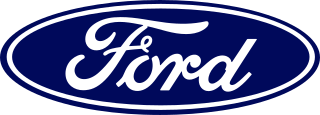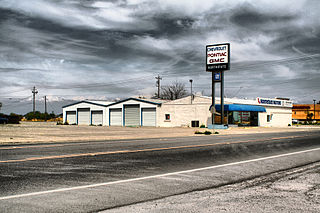
American Motors Corporation was an American automobile manufacturing company formed by the merger of Nash-Kelvinator Corporation and Hudson Motor Car Company on May 1, 1954. At the time, it was the largest corporate merger in U.S. history.

Metro Detroit is a major metropolitan area in the U.S. state of Michigan, consisting of the city of Detroit and over 200 municipalities in the surrounding area with its largest employer being Oakland County. There are varied definitions of the area, including the official statistical areas designated by the Office of Management and Budget, a federal agency of the United States.

Checker Motors Corporation was a vehicle manufacturer, and later an automotive subcontractor, based in Kalamazoo, Michigan. The company was established by Morris Markin in 1922, created by a merger of the firms Commonwealth Motors and Markin Automobile Body, and was initially named the Checker Cab Manufacturing Company. The manufacturer was originally based in Chicago, before moving to Kalamazoo in 1923. The company was renamed Checker Motors in 1958.
The Studebaker-Packard Corporation is the entity created in 1954 by the purchase of the Studebaker Corporation of South Bend, Indiana, by the Packard Motor Car Company of Detroit, Michigan. While Studebaker was the larger of the two companies, Packard's balance sheet and executive team were stronger than that of the South Bend company.

Ford Motor Credit Company LLC, d/b/a Ford Credit, is the financial services arm of Ford Motor Company, and is headquartered in Dearborn, Michigan.
Robert Steven "Steve" Miller Jr. is an American businessman. He was chief executive officer of Hawker Beechcraft from 2012 to 2013, non-executive chairman at American International Group and on the board of directors at Symantec. He has served as Chairman of the Board of Purdue Pharma, Inc. since July 1, 2018.

The PACE Award is an annual award from Automotive News. The focus of the award is an innovation (i) developed primarily by a supplier, (ii) that is new to the automotive industry, (iii) that is in use, and (iv) that "changes the rules of the game". Awards have been given for products, materials, processes, capital equipment, software and services. A panel of independent judges from industry, finance, research, and academia choose finalists from the initial applicants, make site visits to evaluate the innovation, and then gather to select winners, independent of the sponsors. Winners to date include suppliers from Japan, Korea, China, the US, Canada, Brazil, Germany, France, Italy, Poland and other European countries. Among the most awarded companies over the years are BorgWarner, Delphi Automotive, Federal-Mogul, Valeo and PPG Industries as well as Robert Bosch GmbH, Gentex Corporation, and Siemens.
Automotive Components Holdings, LLC is a Ford Motor Company-managed temporary business formed by the 2005 transfer of 17 automotive components factories and six research, testing and other facilities from Visteon Corporation to Ford. The creation of ACH was intended to ensure that Ford continued to receive a flow of parts from the facilities, whilst enabling them to be prepared for sale or other disposition.

François Jean Castaing was a French automotive executive with Renault, American Motors, and Chrysler. He was an engineering graduate from École Nationale Supérieure d'Arts et Métiers in Paris, and worked in Europe for Gordini and Renault before being named vice president for Product Engineering and Development at American Motors Corporation (AMC).

JTEKT Corporation TYO: 6473.T is a Japanese corporation created in January 2006 upon the merger of two companies: Koyo Seiko Co. and Toyoda Machine Works.
Autolite or Auto–Lite is an American brand of spark plugs and ignition wire sets headquartered in Cleveland, Ohio. Autolite products are sold in the United States, Canada, Mexico, and Australia. Until 2011, the Autolite brand was a part of Honeywell's automotive Consumer Products Group, along with FRAM and Prestone. Since then, it has been manufactured and marketed by FRAM Group. Autolite has been the official spark plug of NASCAR since April 2000.

Beginning in the latter half of 2008, a global-scale recession adversely affected the economy of the United States. A combination of several years of declining automobile sales and scarce availability of credit led to a more widespread crisis in the United States auto industry in the years of 2008 and 2009.
The 2009 General Motors Chapter 11 sale of the assets of automobile manufacturer General Motors and some of its subsidiaries was implemented through Chapter 11, Title 11, United States Code in the United States bankruptcy court for the Southern District of New York. The United States government-endorsed sale enabled the NGMCO Inc. to purchase the continuing operational assets of the old GM. Normal operations, including employee compensation, warranties, and other customer services were uninterrupted during the bankruptcy proceedings. Operations outside of the United States were not included in the court filing.

In the United States, the automotive industry began in the 1890s and, as a result of the size of the domestic market and the use of mass production, rapidly evolved into the largest in the world. The United States was the first country in the world to have a mass market for vehicle production and sales and is a pioneer of the automotive industry and mass market production process. During the 20th century, global competitors emerged, especially in the second half of the century primarily across European and Asian markets, such as Germany, France, Italy, Japan and South Korea. The U.S. is currently second among the largest manufacturers in the world by volume.
Pilot Industries was an American company that developed and manufactured fuel and fluid handling systems primarily for the automotive industry. Other products included non-destructive test systems and injection molding equipment. Established in 1977, Pilot's corporate headquarters were in Ann Arbor, Michigan, with technical centers in Dexter, Michigan and in the UK. Manufacturing facilities were located in Dexter, Michigan ; Manchester, Michigan; Clare, Michigan; Reed City, Michigan; Sterling Heights, Michigan; North Vernon, Indiana; Born, Netherlands; and Saltillo, Mexico.
Automotive Components Holdings, LLC (ACH) located in Saline, Michigan was an automotive parts manufacturing plant that specialized in the manufacture of plastics, trim pieces, instrument panels, door panels, consoles, and other various internal plastic parts. On June 1, 2012, Faurecia, a French automotive parts supplier, began operations at the plant.

SRG Global Inc. is one of the largest manufacturers of chrome plated plastic parts for the automotive and commercial truck industries. Headquartered near Detroit in Troy, Michigan, the Tier 1 supplier has manufacturing operations across North America, Europe and Asia. The company’s Advanced Development Center in Taylor, Michigan, is a dedicated facility for developing new plastics coating technology.
GreenTech Automotive was a United States automotive manufacturer founded in 2009 that planned to develop and produce ultralow-power electric cars resembling very small cars or large golf carts. It was a Virginia corporation, with its operations based in Mississippi.
Energy Products Inc. is a privately owned company based in Madison Heights, Michigan. They provide batteries, chargers, industrial utility vehicles, scrubbers/sweepers and recycling services. They sell and maintain industrial batteries and charging systems for forklifts, material handling equipment, AGV’s and utility vehicles used primarily in manufacturing and warehousing. Energy Products is also a wholesale distributor of automotive, deep cycle and sealed lead acid batteries as well as batteries and chargers for consumer electronic devices. In 2012 Energy Products started engineering, furnishing and installing backup power systems, service testing and provides removal services for a wide range of customers including banks, hospitals, property managers and the telecommunication industry. Energy Products offers a comprehensive recycling program for all battery chemistries. In 2013 they announced they recycled over 2,000,000 pounds of batteries in 2012 for customers located throughout the United States.
Satcon Technology Corporation was an energy and power company originally based in Cambridge, and later Boston, Massachusetts. Its markets include the utility, hybrid vehicle, ship building, industrial automation, semiconductor processing, and defense.













